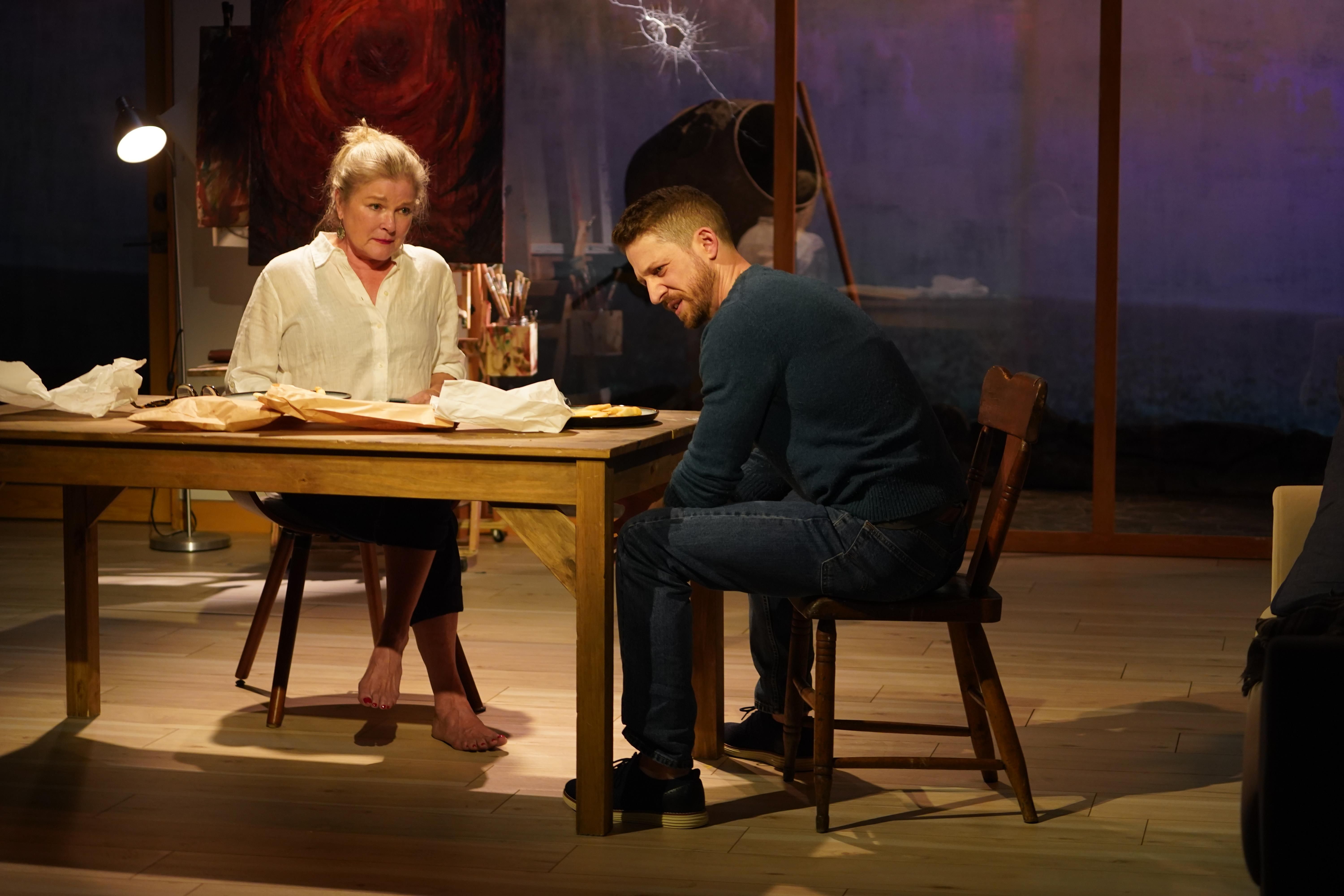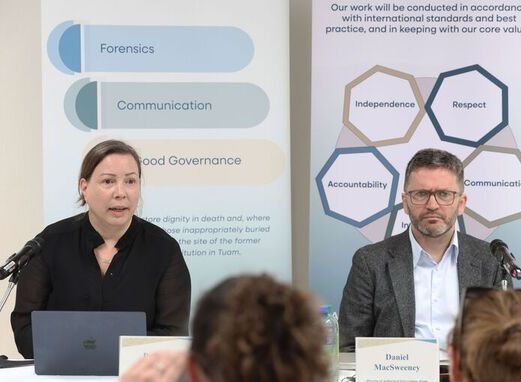Nancy Harris’s play “The Beacon,” which premiered in Galway at the Druid Theatre in 2019, is now receiving its North American premiere at the Irish Repertory Theatre. I spoke with Zach Appelman (a star of TV’s “Sleepy Hollow”), who plays Colm, the son of renowned artist Beiv (Kate Mulgrew), to discuss the process behind the show and get a glimpse of what to expect from this twisted contemporary Irish tale, without giving too much away.
What does it mean to you to be a part of bringing this story to an international audience, introducing a city as theatrical as New York to an Irish-born production?
It’s exciting to get to be part of a show that showcases a new contemporary Irish writer in Nancy Harris. I think American audiences, from my experience, love Irish plays, but we’re far more accustomed to seeing Friel and Shaw and Beckett, and our exposure to new Irish talent is maybe not what it should be and I’m so glad that Nancy’s play is coming to New York because she deserves to be seen everywhere. I think it’s a bit of the best of both worlds because it’s such a contemporary play and many of the themes it deals with are incredibly modern and up-to-date, and the language and the way she writes is incredibly sharp and incisive and modern. Similar to a lot of great Irish plays, it deals with a lot of the same themes of leaving home and returning home; what happens when you leave Ireland and come back, what happens when you’re all of a sudden an outsider in the community that once felt like your own. I think that is a theme that I have found in a lot of Irish plays I’ve read. Without giving too much away, the character who I play, Colm, grew up in Dublin and has been living in San Francisco working as a software engineer for the last 13 years and is coming home for the first time in about a decade, and is experiencing all of that; what does it mean to return? Am I still a part of this community? Have I changed? Has it changed? Do we still fit together?
You initially got started in the theatre world but you also have an extensive background in film and TV - how do you tackle the roles you play in the two different mediums?
In one sense, it’s not that different. The work is the same, but with theatre, you have the luxury of time and rehearsal, and that’s such a gift. Every time I come back to theatre after doing film and television, where you often show up on set and you read through the scene once with your co-stars and the director and you get right into filming, and you only have a minute or so to discuss the possibilities of the scene. We have the luxury in theatre to sit down in a room for three-and-a-half, sometimes four, weeks and explore all of those possibilities. That allows you, I think, to get to different levels and layers of richness and complexity that you aren’t always able to reach in the same way in film and television.
And was your approach to playing Colm in any way different to your previous theatrical roles? Has the Irish setting and writing brought anything new to the table for you in terms of getting into character?
First and foremost, there’s dialect work. I’ve done that for lots of productions but I’d never specifically done a character from Dublin before, so it was exciting to get to work on that. I find that accents and dialects are so interesting because they are also tools for how the audience is going to perceive the character, so it’s not just “we’re going to do a Dublin accent”. What part of Dublin did he grow up in? Where’d he go to school? What’s his socioeconomic status? Colm was born and raised in Sandymount, which has specific connotations.
I know it well!
And, he’s been living in San Francisco for 13 years. How would that have changed his accent? Is it softened? We kind of decided that we didn’t want to go for a really strong, you know, D4 private school accent – I don’t want to offend anybody by saying that!
That’s targeted right at me, but don’t worry about it.
No, but we sort of thought about it and he’s probably 13 years away from that. It’s changed, and he’s also someone who’s a little bit, not embarrassed about his privileged upbringing, but he tries to downplay it. That would’ve affected maybe the way he chose to speak, so then it becomes an interesting process. Marc, our director, a couple weeks before rehearsals, he and I were sending each other YouTube videos back and forth, audio clips of different speakers with different dialects, and we were going “is this closer to what we want?” So, you kind of hone in on something. Hopefully we’ve honed in on something that sounds authentic. A lot of that [Irishness] is in Nancy’s writing. To some extent, the last thing I would want to do is play some preconceived American notion of “Irishness,” because I’m not an authority on that, but Nancy’s one of those writers that puts the right words in the character’s mouth and I think she puts that in there for you. Of course you do research, you research the area and the history, you watch documentaries about things that feel appropriate. At the end of the day, it’s looking to just play the authentic humanity of those characters and let the setting be the indicator of place.
Well, it’s the sign of a great writer if you can read the dialogue and the narrative and immediately know who the characters are.
Absolutely, there are useful things – and these are all just generalizations – but, understanding cultural differences and situations, how is a difficult topic discussed in an Irish family versus an American family? Again, generalizations because every family is different, but are there things that are harder to say culturally? Are there things that are harder to express? Are there things that tend to be more suppressed and pushed to the side? Sometimes I think as Americans we have a compulsion to discuss, discuss, discuss.
The tagline for this play is great. [“A tragic accident, a dead husband, accusations resurfaced by a true crime podcast. Everyone will have a different interpretation. When you look at it, what do you see?”] What should playgoers expect when they go to see “The Beacon”? Do you anticipate multiple interpretations or, on the contrary, a predominant reaction?
Marc has said that he wants it to be a pretty clear interpretation of the truth, but he also said that, although there’s a bit of a mystery to an unsolved death that happens in this play, the last thing we want it to feel like is a whodunnit where that’s sort of the point of the show. The real point of the show is what happens to these people as a result of trying to get to the bottom of something. And the other thing I wanted to add is that it’s just great to see a play like this that focuses on this powerful matriarch, Beiv, played by Kate Mulgrew, and I’ve read so many great Irish plays that focus on the father. It’s great to see one where there’s this ferocious, complex, hilarious, woman driving the whole thing. So, I think that’s going to be a wonderful treat.
“The Beacon,” by Nancy Harris, and directed by Marc Atkinson Borrull, will run on the Francis J. Greenburger Mainstage at the Irish Repertory Theatre through Nov. 3. In addition to Appelman and Mulgrew, it stars Sean Bell, David Mattar Merten and Ayana Workman. Go to irishrep.org for tickets or call 212-727.2737.









